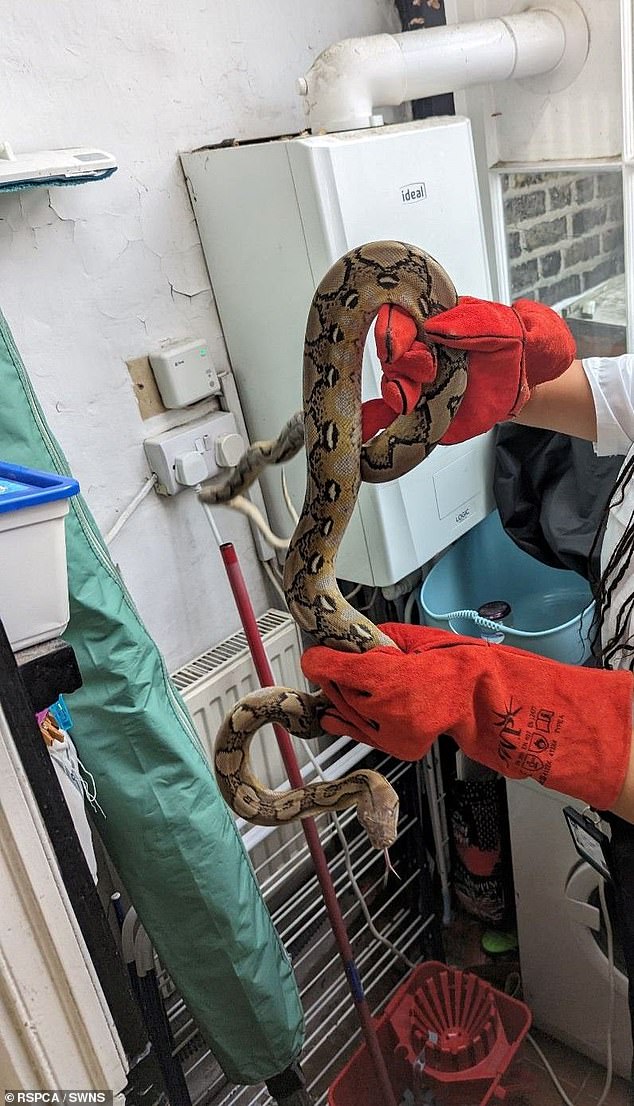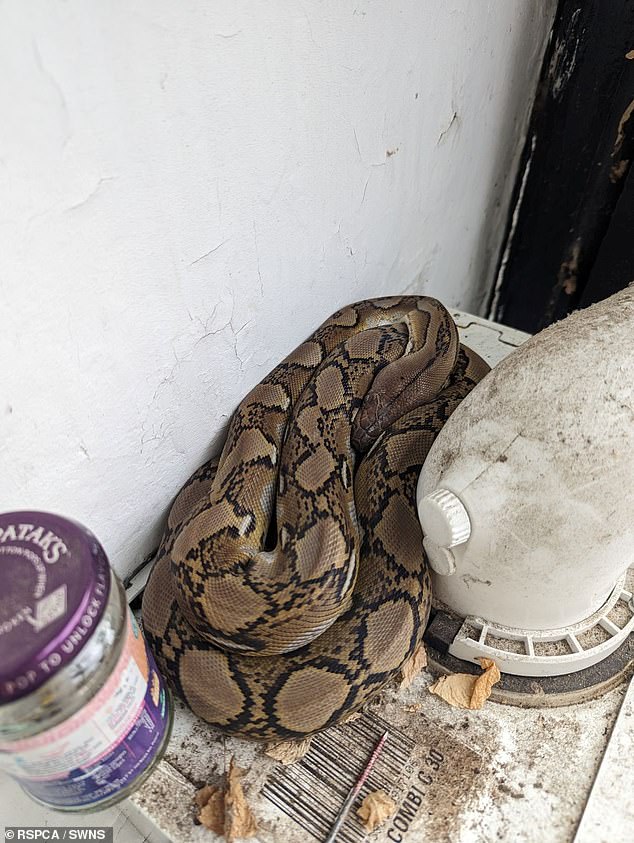Huge 5ft PYTHON terrifies woman by breaking into London home amid worrying surge in number of snake escapes across Britain
A nanny got the shock of her life when she discovered a five-foot snake coiled in the family kitchen, amid a worrying rise in snake escapes in Britain.
The reticulated python was perched on top of the boiler at the property in Tooting, South London.
The shocked woman called the RSPCA who attended to remove the reptile which they believed had been abandoned and crawled into the house.
Animal rescue officer Abigail Campbell visited the home in Lucien Road with fellow RSPCA officer Mat (corr) Hawkins on September 13.
She said: ‘The nanny took Mat and me into the kitchen, she was quite scared of the snake so kept her distance.
The reticulated python was perched on top of the boiler at the property in Tooting, South London
‘When I looked into the room, I saw the python curled up on top of the kitchen boiler.
‘He was probably up there as this would have been the warmest part of the house and snakes need external heat sources to regulate their body temperature.
‘The babysitter thinks he entered the boiler room from the garden through a hole in the wall. We believe he escaped or was left nearby.
‘We have put up ‘Animal Found’ posters in the area and no one has been called yet, so we assume he has been abandoned.
‘He was a bit thin. I gave him a push to make sure he wasn’t aggressive, but he was very calm and let me pick him up with no problem, even though he was clinging very tightly to the boiler pipe, he was very strong.
‘He was very cold and became somewhat lively once he was picked up, looking around and smelling the air.
‘He was placed in a tube bag, where he calmed down and curled up. We took him to South Essex Wildlife Hospital where he now resides.
“Unfortunately, it is not uncommon for us to be called to retrieve an abandoned snake.

The shocked woman called the RSPCA who attended to remove the reptile which they believe had been abandoned and crawled into the house.

Many of the snakes that RSPCA officers are tasked with collecting are thought to be escaped pets
‘We believe that many people are not aware of the great commitment these animals bring when they take them into their homes, and we suspect that the reality of caring for them in these cases has become too much to bear.
‘That’s why we would encourage anyone considering purchasing an exotic pet to find out as much as they can about the animal’s needs and whether it is the right pet for them.
‘It’s so sad because people who are struggling to cope can simply ask for help and advice. That’s why the RSPCA has launched dedicated cost of living web pages.”
Many of the snakes that RSPCA officers are tasked with collecting are thought to be escaped pets.
It comes after data from UK Pet Food showed the number of snakes kept in homes rose from 500,000 to 700,000 in 12 months, while the RSPCA said it received 1,031 reports about the reptiles last year.
The problem is especially serious in summer, as they become more active in warmer temperatures.
Inexperienced keepers have been urged to pay special attention to their pet snakes due to the increasing number of escaped snakes. Pythons, boa constrictors and corn snakes are three of the most popular species to keep.
There are three snakes native to Britain: the adder, which is poisonous; the grass snake, which is harmless and common in gardens; and the slippery snake.
But according to the Sunday Times, there are also about 30 aescalupians – a species of rat snake native to Europe that can grow to more than six feet in length – currently living in the scrub along London’s Regent’s Canal. They live on rats.
Another reason why more snakes escape in the summer is that some owners take them outside to take advantage of the natural sunlight, which causes them to warm up and move quickly, according to the RSPCA.
But the RSPCA’s senior scientific officer Evie Button previously said: ‘Many of the snakes that RSPCA officers are tasked with collecting are believed to be escaped pets.
‘But unfortunately we also have to deal with a lot of abandoned snakes. We notice that many people are not aware of the great commitment these animals bring when they take them into their homes, which we believe contributes to the hundreds of animals that are sadly abandoned every year when their owners no longer can meet their needs.
‘Exotic pets such as snakes often come into the care of the RSPCA after people realize that they are not easy to care for, or that the novelty has worn off.’
The charity always recommends that owners invest in an enclosure that is suitable for the specific species and that the enclosure is kept secure and, if necessary, locked when unattended.
Reptiles, especially snakes, can be extremely good escape artists and will take advantage of a gap in the door of an enclosed space, or a loose-fitting lid.
If someone loses a snake, there are a number of lost and found pet websites where details can be recorded, including PetsLocated.
It is possible to microchip snakes and the RSPCA recommends owners ask their exotics vet about this so that snakes can be easily reunited if lost or found.
